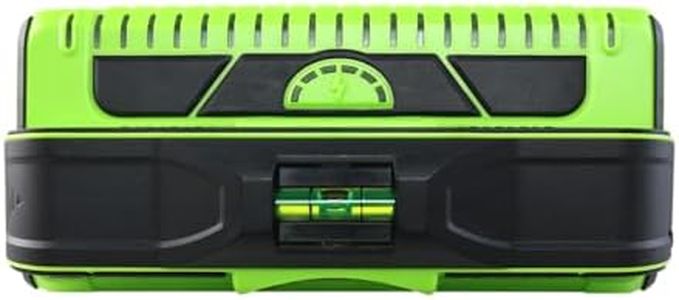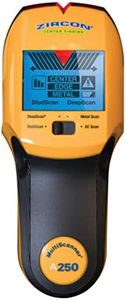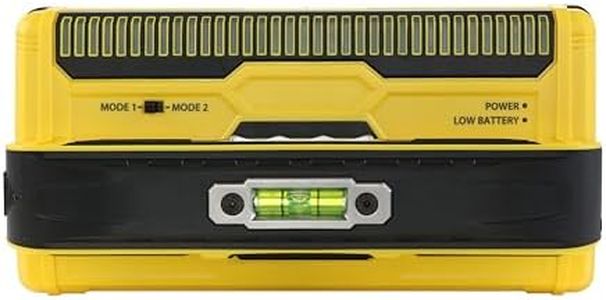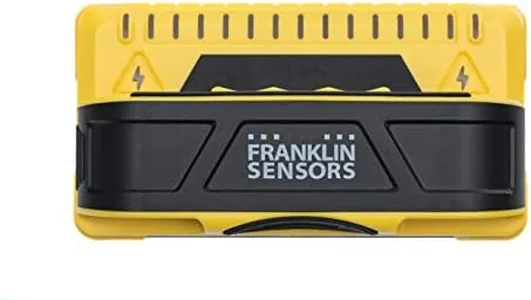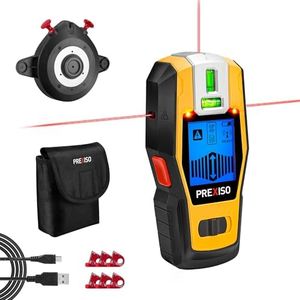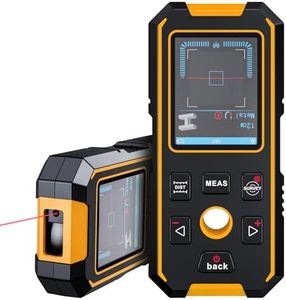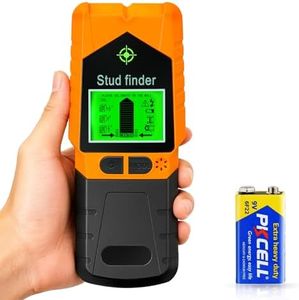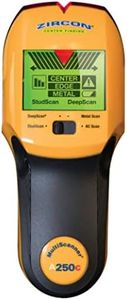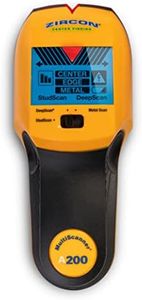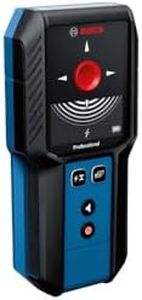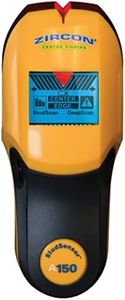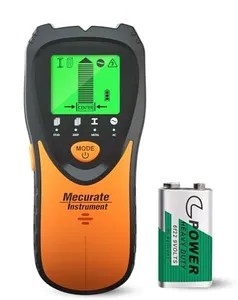10 Best Stud Detectors 2026 in the United States
Our technology thoroughly searches through the online shopping world, reviewing hundreds of sites. We then process and analyze this information, updating in real-time to bring you the latest top-rated products. This way, you always get the best and most current options available.

Our Top Picks
Winner
Franklin Sensors ProSensor M210 Stud Finder with 13-Sensors, Wood & Metal Stud Detector/Wall Scanner, Live Wire Detection (Green), Made in The USA
Most important from
5327 reviews
The Franklin Sensors ProSensor M210 stands out with its impressive accuracy thanks to 13 sensors, which is far more than typical stud finders that usually have only one or two. This means it can detect studs more precisely, showing both their centers and edges at the same time. It works through drywall and sheetrock up to about 1.5 inches deep, making it suitable for most home walls. One of its best features is its simplicity: it uses just one mode for all materials and requires no calibration, so you just press a button and start scanning anywhere on the wall—even over studs—without false signals.
The device also detects live electrical wires, adding a safety feature that many users will appreciate. It runs on two AA batteries, which are easy to replace, and the device is lightweight and durable, praised by both consumers and professionals. On the downside, while it’s very user-friendly, it may be a bit more expensive than basic stud finders, and it relies on batteries that you’ll need to keep handy. Also, with a maximum sensing depth of about 1.5 inches, it may not detect very deeply embedded studs in thicker walls.
This stud finder is ideal for homeowners and DIYers looking for a reliable, quick, and clear tool to locate studs and avoid live wires safely during home improvement projects.
Most important from
5327 reviews
Walabot DIY 2 – Visual Stud Finder & Wall Scanner for Drywall. Detects Wood & Metal Studs, Plastic & Metal Pipes, Live & Non-Live Wires
Most important from
2726 reviews
The Walabot DIY 2 is a smart visual stud finder designed specifically for drywall and plywood walls. One of its biggest strengths is its ability to visually show you where wood and metal studs, pipes, and wires are located inside the wall, which helps avoid relying on just a beeping sound. It detects objects up to about 4 inches deep, which covers most typical wall stud depths.
You control it via your smartphone by connecting directly to the device’s Wi-Fi, and it works with both iPhone and Android, making it quite user-friendly once set up. It runs on a rechargeable lithium-ion battery, so you don’t need to keep buying disposable batteries.
It only works on drywall and plywood and should not be used on other wall types like plaster, concrete, tile, or brick, limiting its versatility. Since it requires a smartphone and app to operate, it might not be the best choice if you prefer a simple standalone tool without much setup. The accuracy is generally good for DIY projects, especially because you can actually see where items are inside the wall, but it might take a bit of practice to interpret the visual information correctly. For those who mostly work with drywall and want a modern, visual approach to finding studs and pipes, this device offers a helpful alternative to traditional stud finders, though it’s less suited for other wall surfaces or professional use.
Most important from
2726 reviews
Zircon MultiScanner A250 All-in-One Stud Finder & Wall Scanner — Metal Detector + Live AC Wire Scanner with ACT, SpotLite Pointer & 4 Scan Modes
Most important from
1360 reviews
The Zircon MultiScanner A250 is a versatile tool combining stud finding, metal detection, and live AC wire scanning in one device, making it handy for home projects where safety and precision matter. It detects wood studs, ferrous and non-ferrous metals, and live electrical wires up to a reasonable depth, giving you confidence in avoiding hazards and locating materials behind walls. Its WireWarning feature is especially useful by alerting you to live wires while scanning, reducing the risk of electrical accidents.
The device uses Auto Correcting Technology to adjust for common scanning mistakes and displays signal strength to help differentiate between shallow and deeper objects. Its ergonomic grip fits comfortably in most hands, and the SpotLite Pointing System clearly marks the target location, which simplifies use for beginners. On the downside, it requires a 9V battery (not included), so you’ll need to have one ready for optimal performance. The plastic build keeps it lightweight but may not feel as rugged as some higher-end models.
Although it doesn’t offer adjustable scan lengths or extremely deep detection, it covers most typical home use cases well. With a clear LCD screen and straightforward controls, it serves as a practical choice for DIYers who want a reliable, multi-function scanner without a steep learning curve.
Most important from
1360 reviews
Buying Guide for the Best Stud Detectors
When it comes to picking a stud detector, it's important to understand that this tool is essential for locating the framing studs behind the surface of your walls. This can be crucial for tasks like hanging heavy items, installing shelves, or mounting a TV. Choosing the right stud detector involves considering several key specifications that will determine its effectiveness and ease of use. Here are the main specs you should focus on and how to navigate them to find the best fit for your needs.FAQ
Most Popular Categories Right Now
